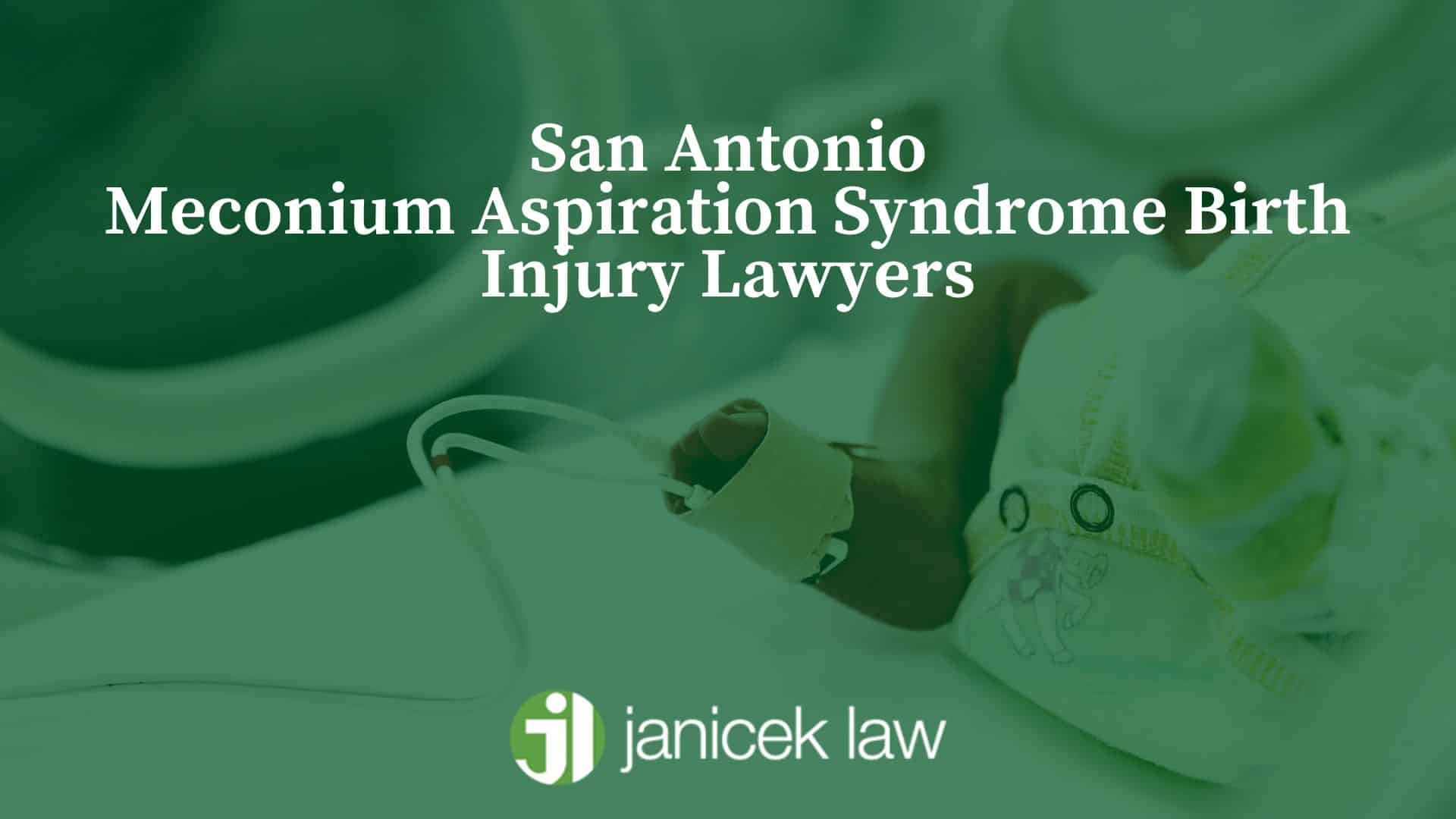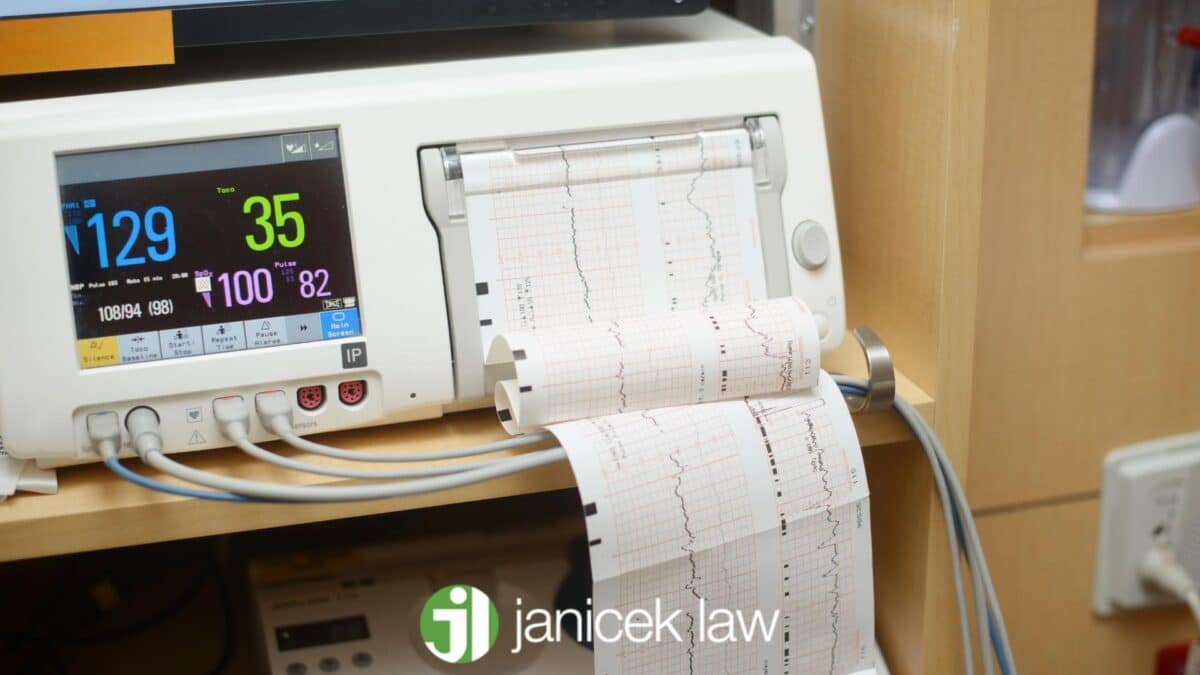Meconium Aspiration Syndrome Lawyers San Antonio
Meconium Aspiration Syndrome Claims in San Antonio
In up to 10% of births across the United States, newborns pass meconium, or the baby’s first poop, in the amniotic fluid. And while this sounds generally safe, it can cause serious complications for both the mother and the baby. Common fetal complications start with basic fetal distress symptoms, such as difficulty breathing, and turn into a permanent brain injury or, worse, death.
If you’re looking into filing a birth injury lawsuit for meconium aspiration syndrome, you’ll need strong legal representation from experienced medical malpractice or birth injury lawyers in San Antonio.
Our San Antonio personal injury lawyers handle birth injury lawsuits for meconium aspiration syndrome in San Antonio, Texas. Our San Antonio birth complication lawyers have over 20 years of dedicated experience and provide a free case review for those who believe medical malpractice was to blame for their child’s injury.
Call our San Antonio personal injury law firm today at 210-366-4949 for a free consultation.
Before we dive into the details of what you’ll need for a birth injury lawsuit, our San Antonio brain injury lawyers will explain some of the basics surrounding meconium aspiration.
What is Meconium?
Meconium is the green to black colored, odorless content in the fetus’s intestines that is passed before childbirth. It develops in the fetal bowel typically between the tenth and sixteenth weeks of gestation. The emission of meconium usually happens for the first time within the baby’s first day of life.
When meconium is released into the amniotic fluid early, this is called meconium staining, and this staining should alert treating physicians that complications could occur.
Meconium Risk Factors in Amniotic Fluid
While meconium isn’t a risk for the fetus, it is for the newborn. So, if a baby passes meconium, this simply indicates that the treating physician or OB-GYN needs to take special precautions when the baby is born to ensure that the meconium doesn’t end up around the baby’s mouth, or worse, inside the baby’s lungs.
This can lead to meconium aspiration syndrome (MAS).
What Causes Meconium Aspiration Syndrome?
Meconium is involved in anywhere from 7% to 20% of live births across the United States. And, around 10% of the time, when meconium is present in the amniotic fluid, it gets into the baby’s lungs and causes respiratory distress or failure. This leads to meconium aspiration syndrome.
Technically speaking, MAS occurs when the meconium travels below the baby’s vocal cords inside the baby’s tracheobronchial tree. This respiratory distress or failure occurs from having meconium in the airway, chest, and the lungs.
So, when the newborn breathes in too much meconium in the amniotic fluid, it will undoubtedly enter the baby’s lungs.
Meconium is toxic when it obstructs the baby’s airways, and in extreme cases, it can over-inflate the baby’s lungs. So, sadly for the baby, MAS is both a chemical obstruction as well as a breathing problem. This results in either immediate or delayed respiratory distress.

Major Risk Factors for Meconium Aspiration Syndrome
Meconium aspiration syndrome occurs when a baby is under extreme stress either before or during birth. Most of the time, fetal stress is attributed to a lack of oxygen.
The most common risk factors for meconium aspiration syndrome include:
- Pregnancy that exceeds the due date
- Maternal infection
- Fetal infection
- Long and/or difficult labor
- Baby getting stuck in the birth canal
- Maternal health conditions, including diabetes, preeclampsia, or hypertension.
Babies whose mothers carry past the expected due date (or 40 weeks) are at the highest risk for meconium aspiration syndrome, as this condition rarely occurs when babies are born early.
Fetuses typically don’t start producing or passing large amounts of meconium until the end of the third trimester. Additionally, the longer the baby remains inside the womb, the less amniotic fluid will surround and protect the baby. So, the longer the baby is in the womb, the more concentrated the meconium will be and the longer the baby will be exposed to the substance.
Additionally, a distressed baby should be a huge red flag for all treating healthcare professionals. Late decelerations in the fetal heart rate should be of particular concern, as well as any decrease in fetal movement.
Contact our San Antonio preeclampsia lawyers to learn more.
Meconium Aspiration Symptoms in Newborns
Symptoms of MAS in newborns include:
- Abnormal breathing or trouble breathing
- Low blood pressure
- Greenish amniotic fluid
- Bluish skin color
- Limpness
If the baby shows extreme trouble breathing, bluish skin color, or any other signs of damage, the neonatal team must act quickly to avoid any brain or organ damage.
Is Meconium Aspiration Syndrome Preventable?
Meconium aspiration syndrome is not always preventable. As a mother-to-be, the best way to prevent any type of birth injury is to take care of yourself and follow all of your doctor’s instructions.
Doctors can help prevent meconium aspiration syndrome by inducing labor early or performing a cesarean section if the patient goes past 40 weeks. If there is meconium in the amniotic fluid before the delivery, the treating physician should seriously consider the possibility of aspiration and take the necessary action for proper care.
Obstetricians and midwives can both be found liable in a medical malpractice lawsuit for not intervening during signs of distress. However, the only way a healthcare provider can prevent severe aspiration or oxygen deprivation is with early detection of meconium.
Our San Antonio malpractice attorneys have extensive experience with meconium aspiration syndrome lawsuits. Call our law firm today to learn more.

Meconium Stained Amniotic Fluid and Failure to Monitor Fetal Distress
Healthy babies that have shown no signs of distress are highly unlikely to aspirate on meconium. But meconium fluid or meconium staining (particularly when it’s thick and dark green) should be a notable sign of potential problems because it’s a marker for sepsis, anemia, or a fetal neurological injury.
Many treating physicians fail to pay attention to finding thick meconium in the amniotic fluid because, for most babies, meconium doesn’t come with serious complications.
However, the newborn’s brain and general health are fragile. So, any increased risk, regardless of how small, should be met with an increase in diligence.
More often than not, symptoms of meconium aspiration sneak up on OBGYNs because of two major causes for concern: low Apgar scores and/or low or high cord blood levels are not always “off.” So, this gives many healthcare professionals a false sense of security if they aren’t diligently monitoring both the mother and baby.
Once the meconium enters the newborn’s mouth, it can be very dangerous. If the doctor isn’t able to provide supplemental oxygen fast enough, the baby can suffer from permanent brain damage, among other health complications.
Do Hospitals Always Test Meconium?
Management of meconium aspiration syndrome involves reducing the risk of MAS with consistent monitoring, accurately diagnosing, and promptly treating the infant after birth to quickly ensure it gets enough oxygen.
In certain cases, meconium aspiration syndrome cannot be prevented. And, in these rare instances, the entire delivery team needs to be on high alert.
If the baby is having trouble breathing and there is obvious meconium staining in the amniotic fluid, the treating physician should take immediate steps to ensure that the baby gets extra oxygen.
In order to treat meconium aspiration syndrome, your doctor or other health care provider should:
- Externally suction the baby’s mouth, nose, and airways to clear out any remaining meconium fluid.
- Internally suction, using a tracheal suction tube to clean out the baby’s airway.
- Use a face mask and ventilator bag to inflate the newborn’s lungs. This helps to deliver oxygen.
- Insert a breathing tube for the breathing machine or ventilator.
Most of the time, the hospital will have a special neonatal team to perform these treatments, as time is of the essence. The neonatal doctors need to restore the oxygen supply as soon as possible to avoid any long-term damage.
Can I Sue If My Baby Swallowed Meconium?
If a doctor fails to promptly identify meconium aspiration syndrome and take the proper action immediately, he or she can be liable for medical malpractice.
Contact our San Antonio hospital negligence lawyers to learn more.

Birth Injury Lawsuit for Meconium Aspiration Syndrome San Antonio
There are two main issues with respect to the meconium that can lead to a medical malpractice or birth injury lawsuit:
- Failure to diagnose meconium aspiration syndrome (MAS)
- Failure to recognize the increased risk that comes with meconium exposure
The first category of MAS medical negligence cases involves the birth injuries themselves. This is where the doctor fails to promptly recognize or diagnose MAS, or when a doctor fails to take proper, immediate action in response to the MAS.
The second category of MAS medical negligence involves birth injury cases where the baby develops delayed complications from MAS because the treating physicians didn’t provide adequate neonatal care.
Meconium Aspiration Syndrome Settlements and Jury Awards
If your child has suffered a birth injury because the OBGYN failed to diagnose MAS or the neonatal or NICU team failed to properly manage the meconium, your family has an opportunity to receive financial compensation for your losses.
Many families struggle with the costs associated with birth injuries. They also are hesitant to reach out to a birth injury lawyer. It’s important to understand that taking legal action against a negligent medical professional is your right. Any money awarded will help cover the medical expenses caused by the negligent medical staff, as well as any other costs for future medical care or treatments your child may need. Additionally, holding negligent medical professionals accountable is the best way to ensure they do not commit these acts of negligence in the future.
Parents of children with birth injuries could file a birth injury lawsuit and recover financial compensation for the following damages:
- Physical pain and suffering
- Past and future medical expenses
- Physical therapy or any other treatments required to help your child
- Emotional distress
- Caregiving expenses if the MAS results in permanent disability
- Expenses associated with any necessary home modifications or medical equipment
- Lost wages (for parents of injured infant)
How much compensation your family receives will depend on the specifics of your birth injury case. Our San Antonio birth injury attorneys can carefully review your medical records, statements, lost wages and more to determine the most accurate birth injury settlement amount for your claim.

How Do You Know if Meconium Aspiration Syndrome Was Caused by Medical Malpractice?
Sometimes MAS can occur even if every treating medical professional does everything right. But, sometimes, MAS occurs as a direct result of medical malpractice, or complications following MAS were a direct result of medical negligence.
If the following happened at any point of your pregnancy, labor, or delivery, you may have adequate grounds to file a birth injury claim:
- Your doctor failed to adequately monitor your baby for signs of distress.
- Your doctor failed to take some action when the mother passed 40 weeks gestation. This action could be any of the following: monitoring both fetal and maternal health closely, inducing labor, scheduling a c-section immediately.
- Your doctor failed to immediately diagnose MAS after birth.
- The medical staff was slow to provide treatment for the mother and/or baby following birth.
- The infant suffered a major health complication such as infection, brain damage, cerebral palsy, Erb’s palsy, or MAS as a result of the doctor’s delayed reaction or inaction.
- The mother suffered a major health complication as a result of the doctor’s delayed reaction or inaction.
- The baby or mother died as a result of the doctor’s delayed reaction or inaction.
If any of the aforementioned situations sound similar to what you experienced, you should seriously consider consulting with an experienced San Antonio birth injury lawyer from Janicek Law.

San Antonio Meconium Aspiration Syndrome Lawyers
Janicek Law is a reputable personal injury law firm that services the San Antonio, Texas area. Our team of birth injury attorneys has over 20 years of experience litigating birth injury cases. Our birth injury lawyers have successfully helped families who have fallen victim to birth injuries, including cerebral palsy, Erb’s palsy, brachial plexus injuries, brain injuries, shoulder dystocia, cephalohematoma, skull fractures, and meconium aspiration syndrome.
Our birth injury lawyers work tirelessly to help parents whose child suffers from MAS. We’ve seen firsthand how much physical, emotional, and financial stress a birth injury can cause a family.
When our birth injury lawyer from Janicek Law takes on a birth injury case, the family has the full support of our law firm. Our clients are provided with some of the best investigators, medical experts, and litigators to ensure that if the birth injury case goes to trial, the chances of a favorable outcome are high. Your birth injury lawyer will not settle your claim unless you’re offered a fair settlement.
Call Janicek Law today at 210-366-4949 for a free consultation. Our San Antonio personal injury law firm operates on a contingency fee basis, so you won’t owe us anything unless your claim is successful.
